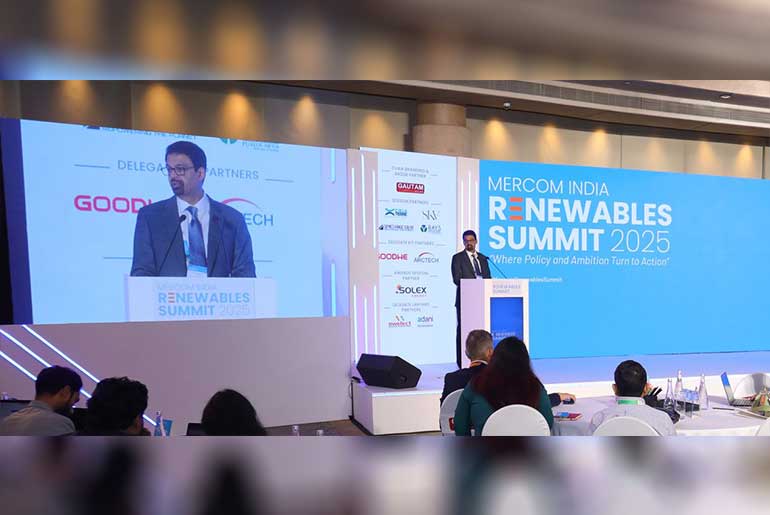The fifth edition of the Mercom India Renewables Summit concluded last week at the Hyatt Regency in New Delhi, drawing record attendance from across India’s clean energy sector. The two-day event featured industry-leading speakers and panelists across critical sessions focused on policy, innovation, infrastructure, and investment in renewable energy.
The Summit featured for the first time an Expo Hall with a curated selection of leading clean energy brands and technology innovators, highlighting India’s local energy ecosystem.
India Urged to Announce Post-2030 Vision for Renewables
In his keynote address, Raj Prabhu, CEO of Mercom Capital Group, called attention to the looming 2030 milestone and the need for a long-term renewable energy target beyond it.
“India has no formal renewable energy target beyond 2030. That’s less than five years away. For this industry to grow in a meaningful, predictable way, we need visibility for the next 5 to 10 years,” said Prabhu. “I urge the government to announce a long-term vision that outlines what the demand landscape looks like beyond 2030 so developers, manufacturers, and investors can plan and allocate capital with confidence.”
Key Insights from the Summit
- India’s Clean Energy Milestone Union Minister for New and Renewable Energy Pralhad Joshi said during his speech at the Mercom India Renewables Summit 2025, “We aimed for 500 GW of non-fossil capacity by 2030. Today, we are proud to say that half of India’s installed power is already from non-fossil sources,” crediting the achievement to the leadership of Prime Minister Narendra Modi.
- Scaling Renewable Projects: With 500 GW of non-fossil capacity targeted by 2030, panelists emphasized the need for rapid infrastructure buildout, regulatory clarity, and streamlined execution to fast-track deployment. Grid readiness and storage adoption emerged as decisive factors.
- Domestic Manufacturing Push: Experts agreed that scaling solar module production is not enough. India must develop a resilient, cost-effective local supply chain, including junction boxes, solar glass, mounting structures, and cables, to sustain long-term growth. “It’s essential for organizations like Mercom to promote domestic R&D. Strengthening R&D within India will reduce our dependence on imported technologies,” said Sunil Sharma, Director (NRE RCM), Ministry of Power.
- C&I Sector Evolution: Project developers are pivoting toward hybrid models, and traditional wind/solar projects are gradually being phased out. With 25 GWh of battery energy storage expected within 18–24 months, demand from data centers is forecast to surpass even that of the steel sector.
- Energy Storage and Green Hydrogen: Battery assets are being recognized as multifunctional resources for grid services and commercial use, not just peak shifting. India is also laying the foundation for large-scale green hydrogen hubs with pilot projects along its western coast.
- Financing Clean Energy: Investor confidence in India’s renewable sector has never been stronger, with lenders actively competing to fund high-impact projects. Private, public, and foreign institutions are actively funding solar, wind, hybrid, and round-the-clock power projects, with energy storage emerging as a key focus for investors.
- Call for Local Skills Development to Accelerate Sector Growth: Across multiple sessions, there was a unified call for urgent investment in local skills development to support the rapid expansion of India’s clean energy sector.
“The industry can grow by 10-20% if it had access to a skilled workforce,” said Raj Prabhu, CEO of Mercom Capital Group.
Simarpreet Singh, Executive Director & CEO of Hartek Group, echoed the sentiment, emphasizing that a skilled workforce could support growth across the industry.
Mercom India Awards
The Mercom India Awards 2025 ceremony was presided over by India’s Union Minister for New and Renewable Energy Pralhad Joshi and Mercom Capital Group CEO Raj Prabhu. There were 13 award categories, recognizing the exceptional work of organizations that contributed to India’s clean energy industry and helped drive the country forward in its energy transition.



